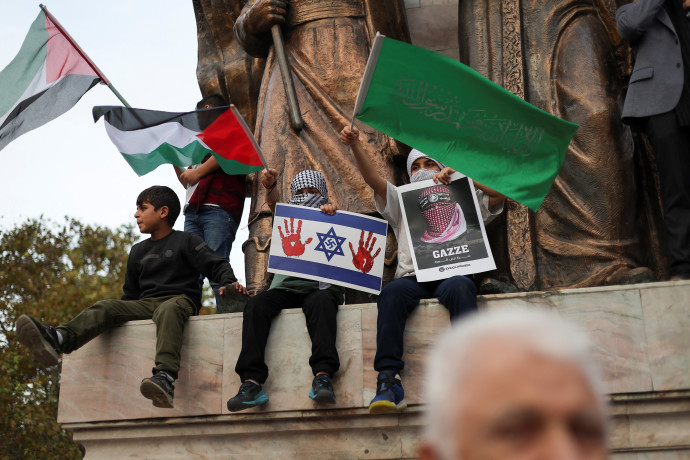Hours after Hamas’ terror attack on the State of Israel, the attack on the Jews of the Diaspora began. Hundreds of thousands of pro-Palestinians took to the streets with the message that the State of Israel is a murderous state that has no right to exist. Swastikas returned to the demonstrations and took us eighty-five years to the Kristallnacht pogrom marked yesterday on November 9. On that date, November 9, 1938, a mob that had been brainwashed for years under the Nazi propaganda machine took to the streets and murdered 91 Jews, burned and smashed 1,400 synagogues and Jewish businesses throughout Germany, Austria, and parts of Czechoslovakia.
This year, the anniversary of Kristallnacht comes in chilling proximity to the thirty-day anniversary of the Hamas massacre – the pogrom in the south of Israel. Then and now, Jews were defenseless against the enemy who came to destroy them. There are many differences between the two pogroms, but the motivation for exterminating the Jews is the same.

Since the massacre, I have spoken with a number of Holocaust survivors around the world. These heroes travel each year – some have attended for the past two or three decades – to the March of the Living in Auschwitz-Birkenau, accompanied by thousands of youth from around the world, Jews and non-Jews, to show them what happens when antisemitism is rampant, and no one does anything.
The Holocaust survivors I spoke to are heartbroken. The massacre flooded them with painful childhood memories. But more than that, they are afraid. Some are afraid to leave their homes. Some are afraid for their families, “They mark us,” a Holocaust survivor from Europe told me. Another survivor from the United States said to me that Jews had never been attacked with such intensity since the Holocaust, and a Holocaust survivor from Canada begged me to “fight antisemitism before it’s too late.”
They’re not alone. A wave of terror is sweeping Diaspora Jewish communities in response to their support for Israel. This is nothing new. Every time Israel acts to defend itself, the “quiet” antisemitism that is constantly on the ground erupts in monstrous proportions. It has become normalized. We have become accustomed to calls to destroy the State of Israel in the streets and seeing people holding signs bearing the symbol of the regime that exterminated six million Jews.
Nevertheless, there are points of light opposite the enormous darkness and the wave of hatred sweeping through Europe and the United States. Austrian Chancellor Karl Nehammer declared that the call ‘Palestine will be liberated from the Jordan River to the sea’ would be considered incitement to murder and would be a criminal offense. German Chancellor Olaf Scholz announced a sweeping ban on Hamas activity in the country and said regarding the antisemitism that has raised its head in Germany: “In times like these, it should be very clear: antisemitism cannot be tolerated in any way. The antisemitism we see at the demonstrations requires a tough political response. There is no place for antisemitism in Germany.”
These responses are welcome but are not enough. What is needed is a more aggressive and harsh response by Western governments and law enforcement agencies against those who riot against Jews, deface homes, and those who sow fear among Jews on the streets and on campuses. The normalization of calls to destroy the State of Israel must stop now before it is too late.
We are one step away from significant harm to Jews. The moment when a grenade will be thrown at a synagogue or when someone will shoot students on their way to synagogue is not far off. One Jew was beaten to death in the United States when he defended the State of Israel holding an Israeli flag, and a Jewish woman was stabbed in her home in Lyon. We cannot close our eyes to this. This is not a horror scenario detached from reality but is a real threat. It has already happened. It happened in the synagogue in Halle in Germany, in 2019 and in Pittsburgh the year before. We already understood that we cannot rely on the empty promise of ‘Never Again’ – not then and certainly not today.
Israelis and Jews around the world are going through difficult days, the toughest in recent decades. In the midst of shared grief and fear, there is shared comfort. During the past two weeks, at the initiative of the Ministry of Diaspora Affairs, delegations of the families of the victims of the massacre and the families of the abductees have embarked on a public information campaign around the world. They traveled to London, Rome, Brussels, the United States, and Canada and received a huge embrace from Diaspora Jews. Hundreds greeted them with Israeli flags at airports, and thousands showed up for demonstrations of support. Galit Goren, the aunt of Tiferet Lapidot z”l, who was murdered at the Supernova Festival in Kibbutz Re’im, told me how much the embrace she received from Canadian Jews encouraged and strengthened her. And she’s not alone, as other participants said the same.
The cliché of ‘we are one people’ has become a reality. Monise Neumann’s pain in Los Angeles is the same as Galit Goren’s pain in Israel. The lives of Diaspora Jews also came to a halt on October 7. They, too, are at war.
The cry of world Jewry, including Israelis, must be heard. Jewish blood is not free for the taking, and Israel’s allies around the world, who have come here and demonstrated unwavering support for Israel’s right to defend itself, should be concerned about the security of Jews in their country.
Revital Yakin Krakovsky is deputy CEO of the International March of the Living
